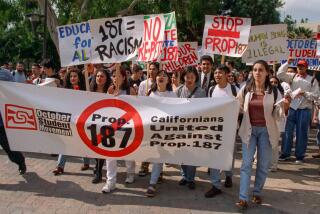Numbers on Judiciary Don’t Equal Justice for All
Long after the Reginald O. Denny beating trial has ended, anger will continue to seethe and a debate will continue to rage over a central controversy in the case--whether blacks and Latinos are treated unfairly by a justice system run by whites.
Anyone who has visited the Downtown court buildings or the judicial outposts in the suburbs is aware of the color of the bench. Less than 10% of Los Angeles County Superior Court judges are black. There aren’t many Latinos, either.
A 1988 California Lawyer magazine study revealed that 88.9% of Republican Gov. George Deukmejian’s appointees were Anglo. The figure was slightly lower--75%--for his predecessor, Democratic Gov. Jerry Brown.
The numbers from the Brown and Deukmejian years are important because their administrations stretched from 1975 to 1991, more than enough time to shape the current Municipal and Superior courts.
Many African-Americans and Latinos believe that this pattern of judicial appointments has resulted in a justice system hostile to minorities. They point to the large number of serious charges heaped on the Denny defendants, along with their high bail, as evidence of this belief--one that, in fact, predates the Denny trial by many decades.
*
I got some insight into the issue last Thursday from Joseph Duff, an attorney and president of the Los Angeles NAACP who reflects the organization’s long commitment to equal justice for all, regardless of race.
Duff has been highly critical of the assault on Denny, a position that has made him unpopular with supporters of the accused. In the Wave newspaper recently, Duff compared Denny’s assailants to a “lynch mob” that attacked the trucker “because of the color of his skin.”
“That’s what we experienced in days gone by in the NAACP,” Duff told his interviewer. “It’s something we fought hard and vigorously to overcome.”
Duff was just as blunt when I first met him in 1977 while he was an attorney in one of the most important civil rights cases in Los Angeles history, the lawsuit to desegregate the Los Angeles Unified School District.
The lawsuit had begun years before under the auspices of black and white liberals. But in the end, the case left Duff and other African-Americans disillusioned with their longtime white allies. Many white liberals pulled their children out of the Los Angeles public schools. And the liberal teachers union fought a section of the desegregation plan that would have permitted the school district to transfer teachers to promote faculty integration.
“The liberal community is the one that crapped out on us,” he said. “It was the dividing point. That’s when things started going downhill.”
That slide, he said, extended to other areas, especially the criminal justice system, as conservative governors, liberal legislators and local politicians of every ideological stripe started escalating the war on crime in the ‘80s.
What happened, Duff said, was that judges in the war were often people “who are trying to grind some ax, teaching the community a lesson. . . . What you have are people who are not part of the community dispensing justice to people below them every day.”
As a result, some people in the black community have become so cynical about the fairness of the court system that they elevated the stature of Denny’s attackers to that of political martyrs--and that is why Duff said he felt compelled to speak up about the assault.
*
To Duff, the legacy of the Denny case is the need to build trust among people who feel that the criminal justice system discriminates against them. He said part of the task rests with black judges, prosecutors and defense attorneys who “have to do a better job of convincing members of their community that they have an influence on the system.”
Moreover, black judges “have not empowered themselves as an advocacy group,” leaving the community with the impression that they have little impact on the judiciary.
That failure became evident during an important moment in the Denny beating case, when then-Dist. Atty. Ira Reiner used a peremptory challenge to remove a black judge, Roosevelt Dorn, from the trial. “I would have wanted the (black) judges to stand up and make the system work (by protesting Dorn’s removal),” Duff said. “There’s no reason a black judge can’t sit on a case like that.”
No reason at all, except for the numbers. “He is the only black (Superior Court) judge in this building,” said Presiding Judge Cecil Mills, when he began searching for a replacement.
People like Joe Duff will remain suspicious until the numbers change.
More to Read
Sign up for Essential California
The most important California stories and recommendations in your inbox every morning.
You may occasionally receive promotional content from the Los Angeles Times.









